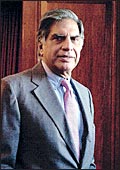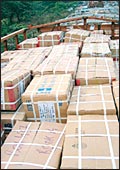 |
| Kamesh Goyal: Profitability concerns
|
Come
January 2007, the highly-regulated general insurance industry
will be unshackled-"de-tariffed," as the Insurance Regulatory
Development Authority (IRDA) terms it, which allows over a dozen
non-life insurance companies to decide their premium rates-but
few CEOs are in a celebratory mood. That's because deregulation
is expected to be followed by a vicious bout of undercutting.
Says Kamesh Goyal, CEO, Bajaj Allianz General Insurance Company:
"The profitability of the non-life industry has been deteriorating
every year and it is expected to get even worse post-de-tariffing."
Goyal is not the only one who feels this
way. A recent study by rating agency CRISIL also points towards
underwriting losses. It reveals that a projected 10 per cent reduction
in own-damage premium for fire, engineering, and motor, accompanied
by a 20 per cent increase in motor third-party (motor TP) premium,
will result in the industry's underwriting losses increasing by
17 per cent. Krishnan Sitaraman, who heads e-financial sector
ratings at CRISIL, says: "Underwriting losses will increase
immediately after 'de-tariffing', as the benefit from the increase
in motor TP premium will be insufficient to offset the impact
of the reduction of premium levels in profitable segments."
CRISIL expects the core business operations of industry players
to remain unprofitable over the medium term.
CRISIL also believes that this is likely
to increase competition in profitable business segments such as
fire and engineering, translating into lower premium. In contrast,
returns from severely loss-making segments, such as motor TP insurance,
are likely to improve to some extent, as industry players raise
premium rates to cover expected claims.
Yet, there are those who believe it is too
early to predict a rate war. "The increase or decrease in
TP motor rates has not yet been decided. It could be more or it
could be less. It is too early to comment," says a cautious
Dalip Verma, MD, Tata AIG General Insurance Company Ltd. But there
are industry officials who counter that investments in manpower,
real estate and distribution will ensure that costs of insurers
will rise. As CRISIL sums it up: "Given their relatively
short track record and lower current profit levels, access to
continued capital infusion will be key to maintaining financial
strength in a 'de-tariffed' scenario."
-Anand Adhikari
Bid
or Blink?
Tata and CSN slug it out for British steel
major Corus.
 |
| Ratan Tata: Steeling for a fight |
The
middle game for Corus had begun, at the time of writing. After
Tata Steel opened with a 455 pence a share for the British steel
giant, Brazilian steel major CSN got into the game with a counter-offer
of 475 pence. Even as speculation mounted about the Tatas' prospects
in a bidding war -or whether it would get into one at all-on December
11, the Indian steel behemoth sweetened its offer to 500 pence.
Within a few hours, CSN was ready with its move-another counter-offer
of 515 pence. While Tata Steel's increased bid placed the value
of Corus at £4.7 billion ($9.19 billion or Rs 41,355 crore),
CNS's offer has increased it by about three per cent to £4.84
billion ($9.47 billion or Rs 42,615 crore). Interestingly, Corus'
valuation has increased by 13 per cent in 45 days. In a statement
released to the media on December 10, Tata Group Chairman Ratan
Tata said: "We remain convinced of the compelling strategic
rationale of this partnership and the revised terms deliver substantial
additional value to Corus shareholders."
December 20 is when Corus shareholders meet,
which gives both parties more time to indulge in fresh rounds
of bidding. When BT went to press, the billion-dollar question
was: Who will blink first? "The deal looks potentially good
(for Tata Steel) in the medium to long term and not so much in
the short term since there will be a lot of debt on Tata Steel's
balance sheet," says Anshukant Taneja, Director (Corporate
Ratings), Standard & Poor's. CSN's track record at concluding
M&A deals isn't great. That may explain its aggression in
the bidding battle for Corus.
-Krishna Gopalan
Fossil
Fashions an India Foray
The global brand acquires Oyzterbay,
ties up with Rajesh Exports.
 |
| Oyzterbay's Nangia: New shine |
Six
years after he exited as coo of Tanishq, the jewellery arm of
Titan, to set up Oyzterbay with the backing of ICF Ventures, Vasant
Nangia has come full circle. His attempt at making affordable
jewellery (mainly in silver) failed to take off and in March this
year he had sold Oyzterbay's retail network of 36 stores to Rajesh
Exports for an estimated Rs 11 crore. Last fortnight Nangia sold
the Oyzterbay brand itself, to the $1.2 billion global jewellery
and watches major Fossil for an undisclosed sum. Nangia will head
Fossil's operation now in India as its new Managing Director.
Fossil has a number of well known watch brands
in its portfolio including DKNY, Diesel, Emporio, Armani, Burberry,
Zodiac, Adidas and Michele. Mark Parker, Senior VP (Asia) of Fossil
said "Internationally jewellery and watches are sold together
as both are fashion items." Fossil will be opening its first
store in India in Bangalore in January.
Fossil India has also entered into a 50:50
JV with Rajesh Exports to source jewellery for the Indian venture.
In turn, Rajesh Exports will also market Fossil's watch brands
in its chain of Labh jewellery stores. Rajesh Mehta, Chairman
of Rajesh Exports, says: "The arrangement is win-win for
both of us. While they source jewelry from us we will be selling
their watches at our showrooms."
Fossil, says Parker, is also examining the
possibility of setting up a manufacturing facility in India. Nangia
adds: "Fossil will continue to invest and grow the Oyzterbay
brand and may take it international also. Once our first store
is up and running we intend to roll out across the country."
-Venkatesha Babu
Going
Against the Book
Reprints meant for the region are being sold
for a song in the West.
 |
| Caught red-handed: A seized consignment
of books |
This
story has its origins in a racket that first came to light some
three years ago, when the Indian subsidiaries of some prominent
American and British publishers registered a sudden spike in sales
by as much as 40 per cent. Much to their chagrin, they found that
educational books written by internationally well renowned authors
such as Philip Kotler, Mikell. P. Groover and Ibrahim Zeid, which
were reprinted in India and meant for sale at concessional rates
within the subcontinent, were being bought in bulk, sold off via
the internet, shipped to Europe and North America and being made
available to university students there at ridiculously low prices.
"We found that books that would typically cost $125-130 (Rs
5,625-5,850) in the us were available off the internet for as
low as $30-35 (Rs 1,350-1,575), all shipping costs inclusive,"
informs Subroto Mazumdar, President and CEO, Pearson Education
(India). This, say publishers, is in complete violation of all
regulations, which prohibit the sale of these books outside the
territories they are meant to be sold in.
An independent investigation conducted by
the Association of American Publishers (AAP) concluded that the
racket was being spearheaded by some of the top publishing houses
in the country (which cannot be named for insufficient documentary
evidence with this writer). The full scale of the matter came
to light when customs officials in New Delhi seized a consignment
of reprinted books being shipped to Lagos, a country they are
not meant to be sold in. The representatives of the exporter,
Indian Crafts Melange (ICM), which sources point out is a front
organisation being operated by two of the biggest publishers in
India, when contacted, refused to comment on the matter. (It is
now understood that ICM has withdrawn the consignment unconditionally.)
The size of the Indian publishing industry
is estimated at Rs 6,000-7,000 crore, of which the reprinting
business is worth around Rs 1,000 crore. Publishers concede that
the resale of management and engineering books in home territories
would dent their revenues by just 4-5 per cent. "Our concerns
are not so much monetary, but ethical and legal," says Manzar
Khan, Managing Director, Oxford University Press, India. Moreover,
they claim that within the subcontinent, India is the only country
that has reprinting rights. Says one publisher on the condition
of anonymity: "Countries like Pakistan have been asking for
reprinting rights for a long time and if such business continues
unabated via India, foreign publishers may be forced to start
reprinting from other countries, something that will not augur
well for Indian students for whom cheap access to international
books is essential."
-Aman Malik
|








